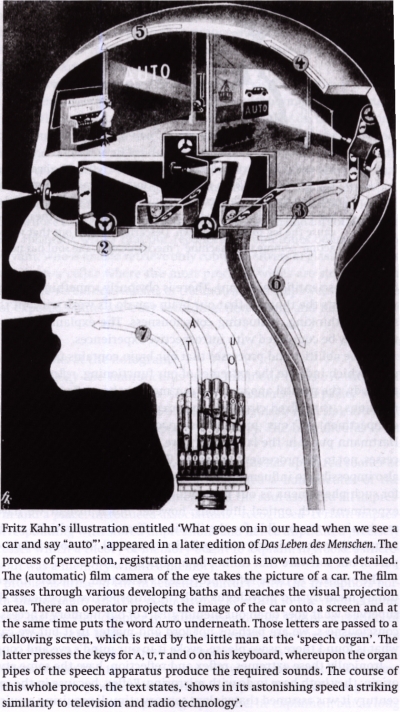Abracadabra: Language, Memory, Representation
Memory
There is little to say about knowledge without the troubling necessity of memory cropping up. The word itself has too much memory, too many meanings, but also two many synonyms: memorial, reminiscence, remembering, recalling, retrieving, reminder, souvenir. Much ink has been spilled in philosophy on the relationship between knowing something, imagining it, remembering it, and perceiving it. Things that can't be perceived can still be remembered (orcs and imaginary numbers for example). Memory is most often associated with storage of some kind, and there are an amazing variety of metaphors for memory throughout the ages:
Some examples
- In Plato's TheaetetusSocrates offers two images: wax blocks and bird-cages.
- Writing and the book are associated with memory from Plato onwards (cf. Phaedrus). The status of writing changes-- denigrated by plato, exalted in the medieval period through association with the bible, and then denigrated again in the period immediately after the printing press. The status of writing concerns the opposition between written or "absent" knowledge and knowledge contained in the mind, or soul or "present knowledge".
- Robert Hooke, in the 17th century, most famous for his researches using the new tool of the microscope, associated memory with phosphor. When shown to light it retains it and glows thereafter.
- The 19th century saw an explosion of metaphors, not unrelated to the explosion in technologies for recording and sensing things: phongraphs, photographs, electroencephalographs, flashbulbss. Curiously, the first phonographs were wax cylinders, much like Socrates' image of the memory.
- Networks have become very popular in the 20th century, especially after the invention of so-called neural networks, but the idea is quite present in William James and the metaphor of the "enchanted loom" that weaves memories and perceptions.
- The mind inside the mind, the homonculus.
- Freud and the image of the Wunderblock.
- Karl Lashley and the engram...
- Popular perceptions: Megamemory
- It is common today to refer to the brain as a computer or the computer as a brain: compare this to Lily Kay's study of the metaphor of DNA as language.
What is the link between writing, print and memory?
Eisenstein's book alerts us to the fact that everything we know about the past we learn from books. Written history is, if not the only form of memory, certainly the most validated and trusted. Though monuments, paintings, inscriptions, and the occasional hand-written manuscript give us access to the past, it is the printed book which has the most force.
The notion of the book-- or the archive-- as a place to store memories (indeed, even the concept of information as having 'content') is one that has been in the making since the origin of the arts of memory. Even in the absense of books, memory is conceived of as a place, or series of places, where things are stored. In order to use it, however, one must associate images with other images or words, in order to make them practically meaningful-- other wise they are, like the letters of the alphabet, meaningless marks.
Individual vs. Social Memories
An important and much discussed distiction is that between an individual's own memory, and a memory held in common. Writing, most obviously, stands in as a proxy for the latter, whereas we imagine the individual's memory to be a chemical or physical aspect of the brain (though it was not always so). It is worth reflecting on what the difference is.
The individual memory, or what is nowadys seen as the 'biological' memory is poorly understood. Cognitive scientists and neuroanatomists have many, many disorganized theories, but none that would count as dominant. Often individual memory is seen as untrustworthy, subjective or personal. It has not always been so. Throughout history, the nature of memory has been discussed alongside the nature of the mind, spirit or soul.
The social (collective) memory, or what is transmitted from person to person, or generation to generation. It need not be written to be transmitted (consider Homer), but written memory has the added quality that it can be forgotten (lost) and remembered again (found).
Western science is often celebrated for being a "cumulative" process. What exactly does this mean? Where is it accumulating, and how do we find it? What is the "memory system" of science? For science to be independent of any individual, it must be stored somewhere. Similarly, History is a science of the memories of culture. Collective memory can be seen as central to the creation of group solidarity or identity. "Our" history. Is this kind of memory more objective than the first?
Finally, also consider memories about us that we do not know: information and data about us that other people collect. What kind of memories are these? Who gets to know them, use them?

A modern image of memory, from Metaphors of Memory, Douwe Draaisma, Cambridge U Press, 2001.